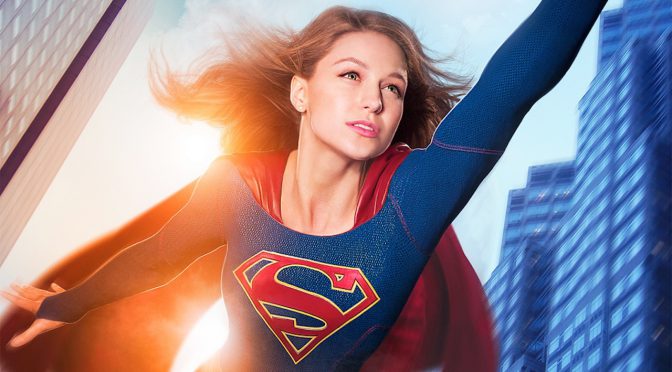I’ve long been a supporter of women getting more respect in the media. Though I don’t feel that every property needs to have a strong female protagonist, I do think that there should be women in the cast of characters who are there to leave an impact on the plot and not just be window dressing. So when I see a property that is actually giving us those kind of female characters, I tend to enjoy it. I’m rather fond of Jessica Jones and I look forward to another season. I respect the hell out of the Hunger Games series (if that hasn’t been clear previously). I just got done defending Rey and Jyn Erso from irrational fans. And I’m currently dismayed that the Ghost in the Shell movie is having problems around its casting because I love The Major and I really want to see her fight a tank in a big budget blockbuster.
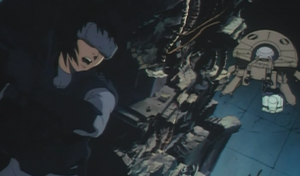
So when Supergirl hit the air on CBS, I was one of the people who watched it and stuck it out through to the end. Together with my friend, I caught it every week – something the ratings tell me was not very common. For 20 episodes we kept up with Kara Zor-El and her supporting cast and agreed that the series had its highs and lows. But when that series ended, both of us had come away with generally the same impression: Supergirl had a lot more lows than we would have wanted, and if it was going to get another season, it needed to do something different. And, looking around, we’re not alone in that opinion.
How could an IP with such promise stumble so hard?
The truth is, Supergirl’s failings had a lot to do with why it was made to begin with. In the days where independent authors and web series are viable options, it’s easy to forget that a lot of the choices being made in entertainment are still coming from a cynical place. Despite my support of Rey and Jyn, I was a bit wary once Disney said that these characters were female “purposefully”. It’s not that I don’t want more female Star Wars characters, clearly, but rather it’s because it means Disney’s executives have a mission statement.
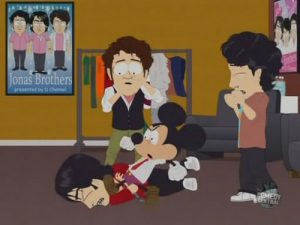
And the problem with that is that when an executive has a mission, they’re doing that because they see it as a trend to capitalize on. This is a bad thing because trends die and generally studios and publishers will throw the baby out with the bathwater the minute a trend stops giving optimal returns. But another reason why I’m not so keen on executives having mission statements is that it often means that bad decisions will be made with good intentions. And how does that impact Supergirl?
Supergirl struggled because the show runners put the message before the story…
Super Girl, Inferior Story
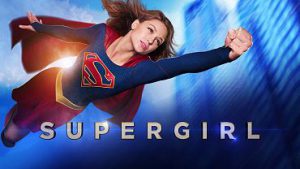
To start, Supergirl had a lot of potential and I knew a couple people who were excited to see it happen. Though “Superman” TV shows have generally been campy, they were always at least fun, and that was something that is sometimes sorely missing from TV lineups. But more than that, this was the first time in many years that a show of the genre was going to be headlined by the normally underrepresented super-heroines. Wonder Woman had a solid show back in the 70s, Birds of Prey had an okay show a little over a decade ago, and besides those… nothing. So there was a lot of reason to want to make this work, especially after the embarrassment that was the Wonder Woman pilot.
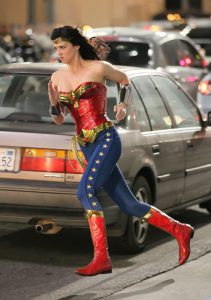
But early on it hit some problems that just couldn’t be overlooked. While people like me were willing to sit through them and stayed with the show all the way, the show went from 12 million viewers at its premiere to 6 million by its finale. It lost half of its audience in a single season – devastating for any show, but especially for a show on one of the big three networks. It seemed, unfortunately, that the show had encountered its Kryptonite. And, sadly, the problems were visible from the very first episode.
Early on, the series makes it clear that the thing they want you to realize is that Supergirl is supposed to be empowering to women. This would be a great theme, but the way they went about it just didn’t work. The first episodes made point to reference her gender repeatedly, even when it didn’t exactly make sense to do so, and these moments were often delivered with eye rolling lines. One example that sprung to mind early in the series was when Hank Henshaw, who had been demonstrably xenophobic and distrustful of aliens altogether, was accused of being sexist for questioning Supergirl early in the series.
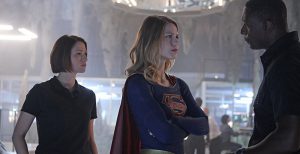
This was already a peculiar moment, given that Hank’s motivations were clearly “anti-alien” (before he was revealed to be a Martian), but he was accused of this by Alex Danvers, Kara’s sister, who had just been questioning Supergirl’s ability and motives in that same episode. This was a common problem in the early episodes. Character motivations were mercurial, even contradictory, because they were tailored to fit what the message needed of them in that moment. Hank, who could have been accused of being racist/speciesist, ends up being accused of being a sexist in that moment because they needed a sexist at that moment. Alex, who had been overly critical and quick to express her doubt, was suddenly needing to come to Kara’s defense. But Alex, herself, was part of a problem that prevailed in the formula of the show for the first few months.
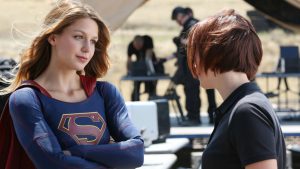
Typically, the structure of a Supergirl episode involved a very annoying repetition of a scenario that should have only happened sparingly at best. Supergirl would have a confrontation with someone who would question whether she should be doing superheroics, be called away to deal with a situation, and then, after being told she couldn’t do it, would promptly fail miserably at those superheroics. Later in the episode, after believing the people who just doubted her, she would be given a pep talk and rally into succeeding – sometimes even by the same person who had doubted her in the first place. So in almost every episode in the first few months, Supergirl proved her critics right and only succeeded once someone else expressed faith in her.
The reason for having this, in theory, is to show how women have to overcome unfair criticisms and questioning in the workplace. Many would say they’ve had to prove themselves more than men in their same position. But in every example this happened in early episodes, Supergirl would promptly prove her critics right. The reason for this? Standard screenwriting structure says that your protagonist has to experience a low point before they can rally back. Thus, screenwriting structure combined with the need to show people doubting her resulted in her proving those doubters right almost every single time. And sometimes the people who talked down to her were random jackasses she just met at the scene.
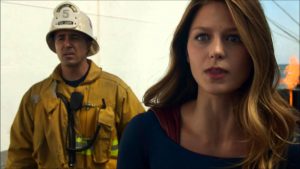
It comes away confused, muddled, and frustrating. I found myself desperately wanting, even needing, Kara to prove those people wrong or pick herself up without a third party giving her a motivational speech. I was left not feeling like Kara was as strong of a character as I knew she could be. It was one thing to set up a situation where she would have to overcome people’s expectations. It’s a completely different thing when she spends most of the series meeting those expectations exactly – for better or for worse. And, in one of the most egregious examples of this early in the series, a fire fighter talked down to her at the scene of a fire and Kara not only failed to put it out but made the situation worse as she ripped open the hull of an oil tanker.
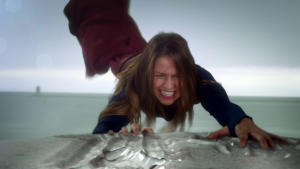
This is not building the character up as someone who overcomes challenges. In trying to present the struggles of real world women, they failed to realize how the events immediately following those moments would make it worse or even break the audience’s suspension of disbelief. How are we to see Supergirl as someone who steps up and does the right thing when you repeatedly demonstrate her failing because people don’t believe in her? And why are these characters who doubt her suddenly swayed to support her after she fails but before she makes her comeback? The contradiction is born from needing to show her struggle but also needing to show those people still get behind her.
And that tendency for contradiction spreads to other aspects of the character dynamics. One of the supporting characters, Winn Schott, is supposed to be presented as a potential love interest. But the need to show some of the negative reactions women encounter makes Winn an unlikeable guy fairly early on. First shown trying to ask her out and failing, his first reaction to hearing she has a secret is to assume she’s turned him down because she’s a lesbian. Later, he is presented as having never admitted his feelings for her, despite first appearing on the show as someone who hits on her repeatedly. He’s also shown to be a caring and supportive character who puts her needs ahead of his own, but later tells her that it’s likely if their relationship doesn’t grow he’s going to become a supervillain.
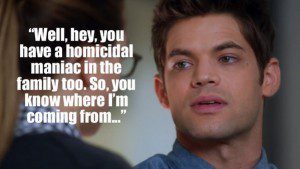
These are clearly two different characters, forced together into one body, and he’s not the only one surrounded in these sorts of contradictions.
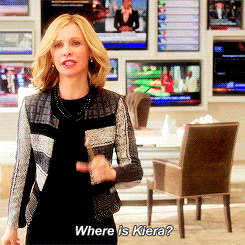
Probably the biggest case of confusing character dynamics is between Kara and her boss, Cat Grant. Cat walks into every scene with the same sort of attitude and behavior that you’d see from Miranda in The Devil Wears Prada. She isn’t tough but fair – she is tough, unfair, and even petty at points. This isn’t to say she’s just demanding, but demeaning and cruel on a level that no one could overlook. At one point in the series, to spite Kara, she actually hires another person to do Kara’s job for her. She doesn’t phrase this as Kara needing “help” either, but rather point blankly tells her this other person has been hired because she has no faith in her – all the while calling her “Kiera”, which we find out in the last episode of the season was intentional all along.
Kara’s response to this mistreatement? She declared to Cat in the final episode that Cat has “the biggest heart of anyone I know” with a perfectly straight face. In fact, despite the fact she is clearly the boss from hell, everyone greatly respects and talks highly of Cat within the company. No one is disgruntled, no one feels like quitting, no one talks back (at least, until Supergirl is dosed with Red Kryptonite and goes evil). It is surreal how much abuse the characters take without really ever voicing genuine displeasure behind the scenes. And the people who do genuinely dislike Cat and don’t put up with her shit? Both became supervillains.

The question is why this would happen. Even Peter Parker takes shots and jabs at Jameson when he’s not in fear of being fired. Pepper Potts openly mocks Tony Stark to his face and points out his every flaw. Even in The Devil Wears Prada we are shown that Miranda is actually not a very good person and that it was in the protagonist’s best interests to get far away from her ASAP. But for Cat, we’re told she’s just great at what she does and her attitude is admirable, even necessary, for her to get where she is. It’s supposedly a necessary evil if you want to be an independent, empowered woman.
But that brings me to the last really big, confusing, problem with the series. Because in an effort to make Supergirl look independent and empowered, they ended up having her make decisions that made no sense in context. From early on, Supergirl and Superman have an understanding that Superman would not interfere in her life unless she asked for his help. He came to help her once, at the request of Jimmy Olsen, and she was upset by this helping hand. Fair enough. But from that moment on, we see situations where Supergirl clearly should have asked for help and simply didn’t even think of it. It’s not even presented as if she’s conflicted in this, she literally just never thinks of it.
And no, I’m not talking about situations where she momentarily loses and has to rally back. She’s a Kryptonian, she can take her lumps and she is more than capable of standing on her own. But in the middle of the season Kara finds herself outnumbered by multiple Kryptonians equipped to defend against their weaknesses. Better equipped, better trained, more cut throat, and using personal ties with her to make her doubt herself – Kara has every reason to ask for a helping hand in this situation. Instead, she leaves Superman out of the loop. In fact, the show goes so far out of their way to keep him out of it that when she finally does decide to ask for his help she finds that he’s not even on the planet. And when he comes back? He’s rendered helpless.
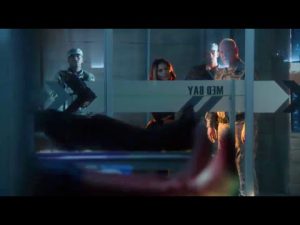
Even my friend, a woman working to get into the television industry, was openly frustrated by the way they used Superman.
But they had to, because in their minds if they used Superman in any other way they would have risked Supergirl looking like she couldn’t do it on her own. Maybe there was some embargo on making him appear, but if that were the case there were better ways to make that happen. Instead, it seemed like from start to finish, they needed to make Supergirl look stupid to avoid making her look weak. And that’s basically what happened in almost every situation. To make their message stand out, they actively sabotaged plots and characters to fit the moment as needed. They were afraid if you present Cat as an unlikeable person, or if you didn’t have someone like Winn say something horrible, or if you let Kara ask for help, that it would somehow damage the overall vision or even risk overshadowing Kara.
But knowing the character, knowing her past, I don’t agree with the idea she would be overshadowed. Because not only do I think she can stand on her own…
I know she could have stood with the “big boys”.
(I’m a writer who writes novels by day and screenplays by night. Meanwhile, I tweet whenever I damn well please.)


